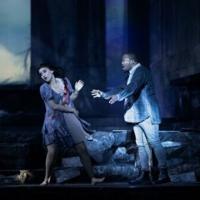Experts argue that South African opera has developed its own unique style over the past three decades since the end of apartheid. The makeup of the casts and the dramatic themes have become distinctly local.
Since the removal of racial barriers in 1994, opera in South Africa has seen a significant increase in popularity, drawing talent from the country’s rich choral traditions. This has established opera as an important part of the diverse cultural landscape in the country.
The Cape Town Opera, founded 25 years ago, has played a crucial role in driving these changes and is considered the most successful opera company in Africa.
The company was co-founded by Italian-born Angelo Gobbato, a former singer, shortly after the end of apartheid. Gobbato was recently honored with a lifetime achievement award for his contribution to South African opera.
Initially, the company used lead singers from abroad for productions, but a recent run of “Lucia di Lammermoor” featured an all-South African cast with only one white singer, showcasing the shift towards more diverse representation.
After the end of white-minority rule, there was a growing interest from black students in opera training. This was a significant change for the Cape Town opera school, which previously had mainly non-white students.
– Big-name singers –
Many internationally acclaimed artists, such as Pretty Yende and Levy Sekgapane, emerged from Gobbato’s training. They often came from community choirs grounded in Western singing traditions and naturally gravitated towards opera.
As the casts and audiences have become more representative of South Africa’s diversity, opera has become more accessible to everyone. The Cape Town Opera’s outreach program, which includes performances in schools and townships, has played a key role in making opera relevant to a broader audience.
– ‘A South African genre’ –
Opera in South Africa now tackles relevant themes that resonate with the country’s current context, dealing with issues like politics, sex, violence, and more. Productions of European classics have been adapted to reflect a uniquely South African perspective in terms of characters, settings, and music.
According to critic and author Wayne Muller, this process of transformation in the South African opera scene is ongoing. The blending of Western European repertoire with local themes has helped establish opera as a distinctly South African art form.
Opera has become a genre that is deeply rooted in South Africa and is evolving to reflect the country’s diverse cultural landscape.
br/fg





